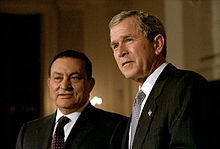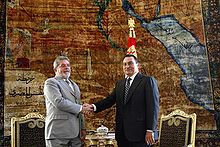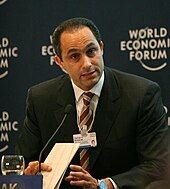As an Egyptian Air Force officer, Mubarak served in various formations and units, including two years when he served in a Spitfire fighter squadron.[7] Some time in the 1950s, he returned to the Air Force Academy, this time as an instructor, remaining there until early 1959.[7] From February 1959 to June 1961, Mubarak undertook further training in the Soviet Union, attending a Soviet pilot training school in Moscow and another at Kant Air Base, near Bishkek in Kyrgyzstan (then a Soviet republic), an airfield that is today home to the Russian 5th Air Army's 999th Air Base.
Mubarak undertook training on the Ilyushin Il-28 and Tupolev Tu-16 jet bomber, and then joined the Frunze Military Academy in 1964. On his return to Egypt, Mubarak served in wing and then base commander appointments, taking up command of the Cairo West Air Base in October 1966 before briefly commanding the Beni Suef Air Base.[7] In November 1967 Mubarak became the Air Force Academy's commander[8] and two years later he became Chief of Staff for the Egyptian Air Force.
Mubarak became Commander of the Air Force and Egyptian Deputy Minister of Defence in 1972. In the following year his military career reached its pinnacle when he was promoted to Air Chief Marshal in recognition of service during the October War of 1973.[7][9] Mubarak has been credited in some publications for Egypt's initial strong performance in the 1973 war against Israel.[10] As Mubarak was only in post for about a year when the war erupted, his role with the Egyptian Air Force was disputed by many.[citation needed] Among those who disputed the role of Mubarak was the know Egyptian analyst Mohamed Hasanain Haikal, whose evaluation of the role of the Air Force in 1973 was different from that of Mubarak and his supporters. Haikal, in a television interview dated February 19, 2011 argued that the Air Force had mostly a psychological function to the Egyptian forces in 1973, providing blanket coverage for the ground troops that carried the crossing of Suez Canal. Haikal argued that this blanket coverage was for psychological reassurance to the ground troops, not due to any military necessity.[11] The role of Mubarak was further disputed by Shahdan Elshazli the daughter of the former Egyptian military Chief of Staff Saad Eldin Elshazli. She alleged that Mubarak altered the representation of a number of events pertaining to the 1973 war to show a magnified role for himself. In an interview with the Egyptian independent newspaper Almasry Alyoum (Feb 26th 2011), Elshazli claimed that Mubarak altered documents to take credit for the initial success of the Egyptian forces in 1973 from her father. She alleged that even photographs pertaining to the discussions in the military command room were altered, so that the pictures of Saas Eldin Elshazli was erased and replaced by Mubarak. She stated that she intends to take a legal action with this regard.[12]
Vice President of Egypt
In April 1975, Mubarak was appointed by Sadat as Vice President of the Egyptian republic. In this position, he loyally served Sadat's policies. He took part in government consultations that dealt with the future disengagement of forces agreement with Israel.[13]As part of his support for Sadat's policies, he went in early September 1975 on a mission to Riyadh and Damascus, in order to convince the Saudi and Syrian governments to accept the disengagement agreement signed with the Israeli government ("Sinai II"), but was refused a meeting by the Syrian president.[14][15]
In addition, Mubarak was sent by Sadat to numerous meetings with foreign leaders.[16] Mubarak's political significance as Vice-President can be seen from the fact that at a conversation held on 23 June 1975 between Foreign Minister Fahmy and US Ambassador Hermann Eilts, Fahmy said to Eilts that "Mobarek [sic] is, for the time being at least, likely to be a regular participant in all sensitive meetings" and he advised the Ambassador not to antagonize Mubarak, as he was Sadat's personal choice.[17]
President of Egypt
Following the assassination of President Sadat in October, 1981 by a Jihad cell in the military led by Lieutenant Khalid Islambouli, Hosni Mubarak became the President of the Arabic Republic of Egypt, and the Chairman of the National Democratic Party (NDP). He was the longest serving President of Egypt, his term lasting 29 years.Egypt's return to the Arab League
Egypt is the only state in the history of the Arab League to have had its membership of the League suspended, due to President Sadat's peace treaty with Israel. However, in 1989, eight years after Sadat's assassination, Egypt was re-admitted as a full member, and the League's headquarters were relocated to their original location in Cairo.[18]Wars and the monetary gain from the Gulf War of 1991
Egypt was a member of the allied coalition in the 1991 Gulf War, and Egyptian infantry were some of the first to land in Saudi Arabia to evict Iraqi forces from Kuwait.Reports that sums as large as $500,000 per soldier were paid or debt forgiven were published in the news media. According to The Economist:
- The programme worked like a charm: a textbook case, says the IMF. In fact, luck was on Hosni Mubarak's side; when the US was hunting for a military alliance to force Iraq out of Kuwait, Egypt's president joined without hesitation. After the war, his reward was that America, the Arab states of the Persian Gulf, and Europe forgave Egypt around $14 billion of debt.[19]
Assassination attempts
According to the BBC, Mubarak has survived six assassination attempts.[18] In June 1995 there was an alleged assassination attempt involving noxious gases and Egyptian Islamic Jihad while he was in Ethiopia for a conference of the Organization of African Unity.[20] Upon return Mubarak is said to have authorized bombings on Al-Gama'a al-Islamiyya which by 1999 saw 20,000 persons placed in detention related to the revolutionary Islamic organizations.[citation needed] He was also reportedly injured by a knife-wielding assailant in Port Said in September 1999.[21]Stance on the invasion of Iraq in 2003
President Mubarak spoke out against the 2003 Iraq War, arguing that the Israeli-Palestinian conflict should have been resolved first. He also claimed that the war would cause "100 Bin Ladens."[22] However, as President he did not support an immediate US pull out from Iraq as he believes it will lead to probable chaos.[23]Changing economic scene
| | This section does not cite any references or sources. Please help improve this article by adding citations to reliable sources. Unsourced material may be challenged and removed. (February 2011) |
2005 elections
Main article: Egyptian presidential election, 2005
| | This section has been nominated to be checked for its neutrality. Discussion of this nomination can be found on the talk page. (October 2010) |
After increased domestic and international pressure for democratic reform in Egypt, Mubarak asked the largely rubber stamp[citation needed] parliament on 26 February 2005 to amend the constitution to allow multi-candidate presidential elections by September 2005[citation needed]. Previously[when?], Mubarak secured his position by having himself nominated by parliament, then confirmed without opposition in a referendum.
The September 2005 ballot was therefore a multiple candidate election rather than a referendum, but the electoral institutions, and security apparatus remain under the control of the President. The official state media, including the three government newspapers and state television also express views identical to the official line taken by Mubarak. In recent years however, there has been a steady growth in independent news outlets, especially independent newspapers which occasionally criticize the President and his family severely[citation needed]. Satellite channels beaming from Egypt such as the Orbit Satellite Television and Radio Network for example, also exhibit relative openness as exhibited in their flagship program Al Qahira Al Yawm. In the last few years however, the cabinet headed by Prime Minister Ahmed Nazif has been somewhat successful in turning things around. According to the List of countries by Human Development Index Egypt ranks 111th out of 177 countries, and rates 0.702 on the index.
On 28 July 2005, Mubarak announced his candidacy, as he had been widely expected to do. The election which was scheduled for 7 September 2005 involved mass rigging activities, according to civil organizations that observed the elections.[24] Reports[citation needed] have shown that Mubarak's party used government vehicles to take public employees to vote for him. Votes were bought for Mubarak in poor suburbs and rural areas. It was also reported that thousands of illegal votes were allowed for Mubarak from citizens who were not registered to vote. On 8 September 2005, Ayman Nour, a dissident and candidate for the El-Ghad Party ("Tomorrow party"), contested the election results, and demanded a repeat of the election.
In a move widely seen as political persecution, Nour was convicted of forgery and sentenced to five years at hard labor on 24 December 2005.[25] On the day of Nour's guilty verdict and sentencing, the White House Press Secretary released the following statement denouncing the government's action:
"The United States is deeply troubled by the conviction today of Egyptian politician Ayman Nour by an Egyptian court. The conviction of Dr. Nour, the runner-up in Egypt's 2005 presidential elections, calls into question Egypt's commitment to democracy, freedom and the rule of law. We are also disturbed by reports that Mr. Nour's health has seriously declined due to the hunger strike on which he has embarked in protest of the conditions of his trial and detention. The United States calls upon the Egyptian government to act under the laws of Egypt in the spirit of its professed desire for increased political openness and dialogue within Egyptian society, and out of humanitarian concern, to release Mr. Nour from detention."[26]
According to Reporters Without Borders; Egyptian media ranks 133 out of 168 in freedom of the press,[27] showing an improvement of 10 places from 2005.
State corruption during Mubarak's presidency
While in office, political corruption in the Mubarak administration's Ministry of Interior rose dramatically, due to the increased power over the institutional system that is necessary to secure the prolonged presidency.[clarification needed] Such corruption has led to the imprisonment of political figures and young activists without trials,[28] illegal undocumented hidden detention facilities,[29][30] and rejecting universities, mosques, newspapers staff members based on political inclination.[31] On a personnel level, each individual officer is allowed to violate citizens' privacy in his area using unconditioned arrests due to the emergency law.In 2005 Freedom House, a non-governmental organization that conduct research into democracy, reported that the Egyptian governments, under Mubarak expanded bureaucratic regulations, registration requirements, and other controls that feed corruption. Whenever Egyptians face such controls, money is what ultimately triggers the requisite signature or relevant approval. Compounding the normal bureaucratic culture is the state ownership of many or most of the primary economic levers – banking and financial institutions, tourism, oil, the Suez Canal, manufacturing, the media, and so on. Furthermore, government employees receive insufficient pay, while a decreasing minority of Egyptians achieve increasingly vast wealth, thus creating a growing income gap between the classes and causing the supposed middle class to be squeezed to the smallest minority between the rich and the poor. Freedom House claimed that corruption has remained a significant problem under Mubarak, who promised to do much, but in fact neither has done anything significant to tackle it effectively.[32]
In 2010, Transparency International's Corruption Perceptions Index report assessed Egypt with a CPI score of 3.1, based on perceptions of the degree of corruption from business people and country analysts, with 10 being very clean and 0 being highly corrupt. Egypt ranked 98th out of the 178 countries included in the report.[33]
Emergency law rule
Egypt is a semi-presidential republic under Emergency Law (Law No. 162 of 1958)[34] and has been since 1967, except for an 18-month break in 1980s (which ended with the assassination of Anwar Sadat). Under the law, police powers are extended, constitutional rights suspended and censorship is legalized.[35] The law sharply circumscribes any non-governmental political activity: street demonstrations, non-approved political organizations, and unregistered financial donations are formally banned. Some 17,000 people are detained under the law, and estimates of political prisoners run as high as 30,000.[36] Under that "state of emergency", the government has the right to imprison individuals for any period of time, and for virtually no reason, thus keeping them in prisons without trials for any period. The government continues the claim that opposition groups like the Muslim Brotherhood could come into power in Egypt if the current government did not forgo parliamentary elections, confiscate the group's main financiers' possessions, and detain group figureheads, actions which are virtually impossible without emergency law and judicial-system independence prevention.[37] Pro-democracy advocates in Egypt argue that this goes against the principles of democracy, which include a citizen's right to a fair trial and their right to vote for whichever candidate and/or party they deem fit to run their country.[citation needed]Presidential succession
In 2009, US Ambassador Margaret Scobey reported uncertainty regarding presidential succession, stating "Despite incessant whispered discussions, no one in Egypt has any certainty about who will eventually succeed Mubarak nor under what circumstances."[38] She listed likely candidates, saying, "The most likely contender is presidential son Gamal Mubarak (whose profile was ever-increasing at the ruling party, until that party collapsed during The Egyptian Revolution of 2011); some suggest that intelligence chief Omar Suleiman might seek the office, or dark horse Arab League Secretary-General Amre Moussa might run. Mubarak's ideal of a strong but fair leader would seem to discount Gamal Mubarak to some degree, given Gamal's lack of military experience, and may explain Mubarak's hands off approach to the succession question."[38] President Mubarak and his son denied this, "saying [that] a multi-candidate electoral system introduced in 2005 has made the political process more transparent."[39] Nigerian Tribune journalist Abiodun Awolaja described a would-be succession by Gamal Mubarak as a "hereditary pseudo-monarchy".[40] Ambassador Scobey summarised Mubarak's vision of the presidential succession, stating, "Indeed, he seems to be trusting to God and the ubiquitous military and civilian security services to ensure an orderly transition."[38] The National Democratic Party of Egypt continued to state that Hosni Mubarak was to be the party's only candidate to the 2011 Presedential Elections. Mubarak declared on February 1, 2011 that he had no intention to run in the presidential race at the end of 2011. When this declaration failed to ease the protests, Mubarak's vice president stated that Gamal Mubarak, the son, will not run for president. With the escalation of the demonstration and the fall of Mubarak, a former influential figure in the National Democratic Party Hamdy El-Sayed, claimed that Gamal Mubarak intended to forcibly take over his father's position, assisted in that by the then Interior Minister, Habib El-Adly.[41]Israeli-Palestinian conflict
Hosni Mubarak is generally supportive of Israel. As he has been involved intensely in the Arab League, he has supported Arab efforts to achieve a lasting peace in the region. The current position of the League is that which was endorsed at the Beirut Summit, on 28 March 2002. At the summit the league adopted the Arab Peace Initiative,[42] a Saudi-inspired peace plan for the Arab–Israeli conflict. The initiative offered full normalization of the relations with Israel. In exchange, Israel was demanded to withdraw from all occupied territories, including the Golan Heights, to recognize an independent Palestinian state in the West Bank and the Gaza Strip with East Jerusalem as its capital, as well as a "just solution" for the Palestinian refugees. The Peace Initiative was again endorsed at 2007 in the Riyadh Summit. In July 2007, the Arab League sent a mission, consisting of the Jordanian and Egyptian foreign ministers, to Israel to promote the initiative.
1 September 2010. During Middle East negotiations, Mubarak and Prime Minister Benjamin Netanyahu of Israel look at their watches to see if it is officially sunset; during Ramadan, Muslims fast until sunset.
The agreement required Hamas to end rocket attacks on Israel and to enforce the lull throughout Gaza. In exchange, Hamas expected the blockade to end, commerce in Gaza to resume, and truck shipments to be restored to 2005 levels, which was between 500 and 600 trucks per day.[45][46] Israel tied easing of the blockade to a reduction in rocket fire and gradually re-opened supply lines and permitted around 90 daily truck shipments to enter Gaza, up from around 70 per day.[47] Hamas criticized Israel for its continued blockade[48] while Israel accused Hamas of continued weapons smuggling via tunnels to Egypt and pointed to continued rocket attacks.[45]
However, when conflict again ensued during the Gaza War, Egypt's foreign minister stated that Hamas had brought it upon itself.
In 2009, Mubarak's government banned the Cairo Anti-war Conference, which has criticised his lack of action against Israel.[49]
Revolution and resignation
Main article: 2011 Egyptian revolution

Massive protests centered on Cairo's Tahrir Square led to Mubarak's resignation in February 2011.
A few hours prior to the resignation announcement, reports surfaced suggesting the ousted president and his immediate family had left Cairo for Sharm el-Sheikh.
Reports and speculations about condition following resignation
Since his resignation, Mubarak did not make any media appearance, which led to some speculations about his real condition. Some reports claimed that he went into a coma.[55] Other suggest that because he is still present in Egypt he is still playing a role in the government in secret. Whether that is the case or not, the former President's presence in Sharm el-Sheikh is stopping much of the tourism that is going on there because of security reasons.On February 28, 2011, the General Prosecutor of Egypt issued an order prohibiting Mubarak and his family to leave Egypt. It was reported that the former President was in contact with his lawyer in case of possible criminal charges against him.[56]







Tidak ada komentar:
Posting Komentar